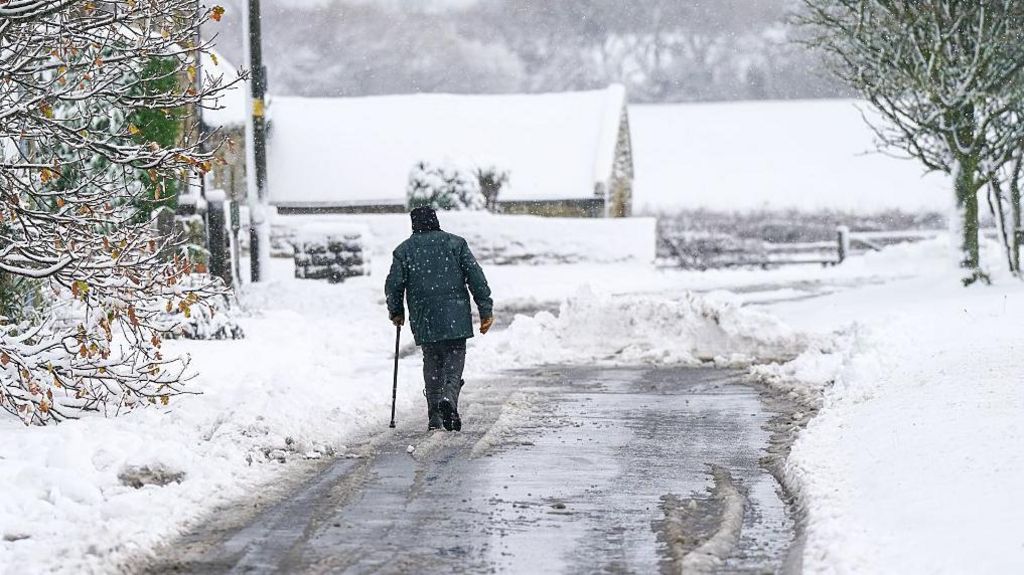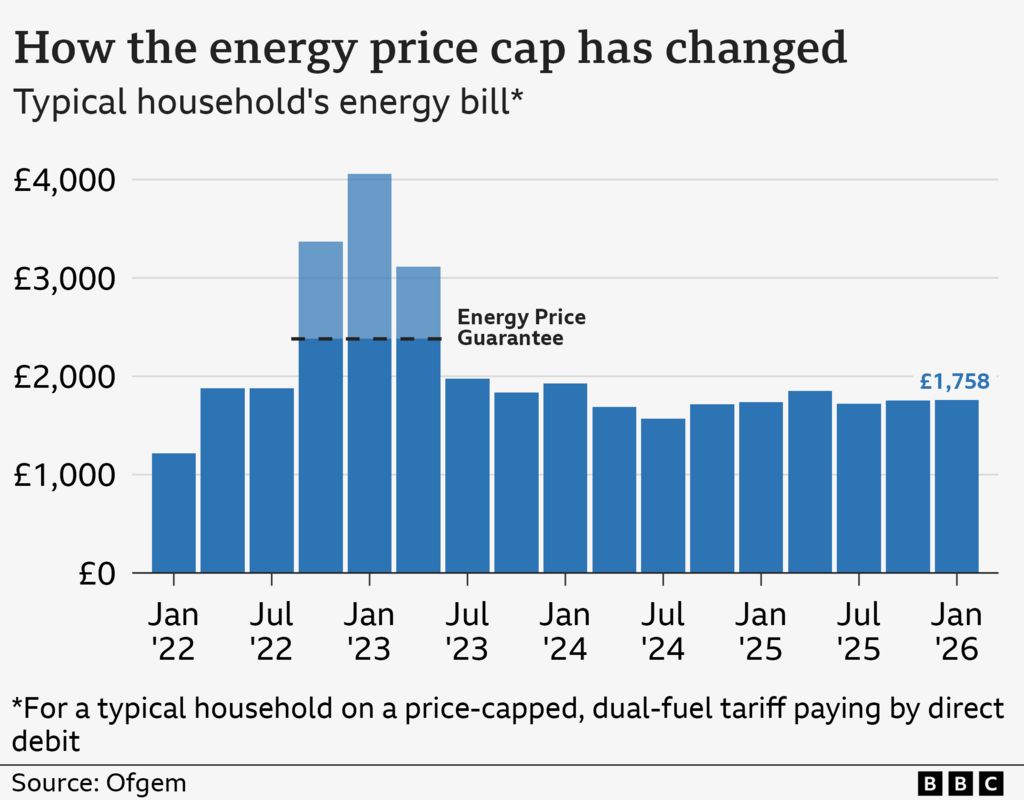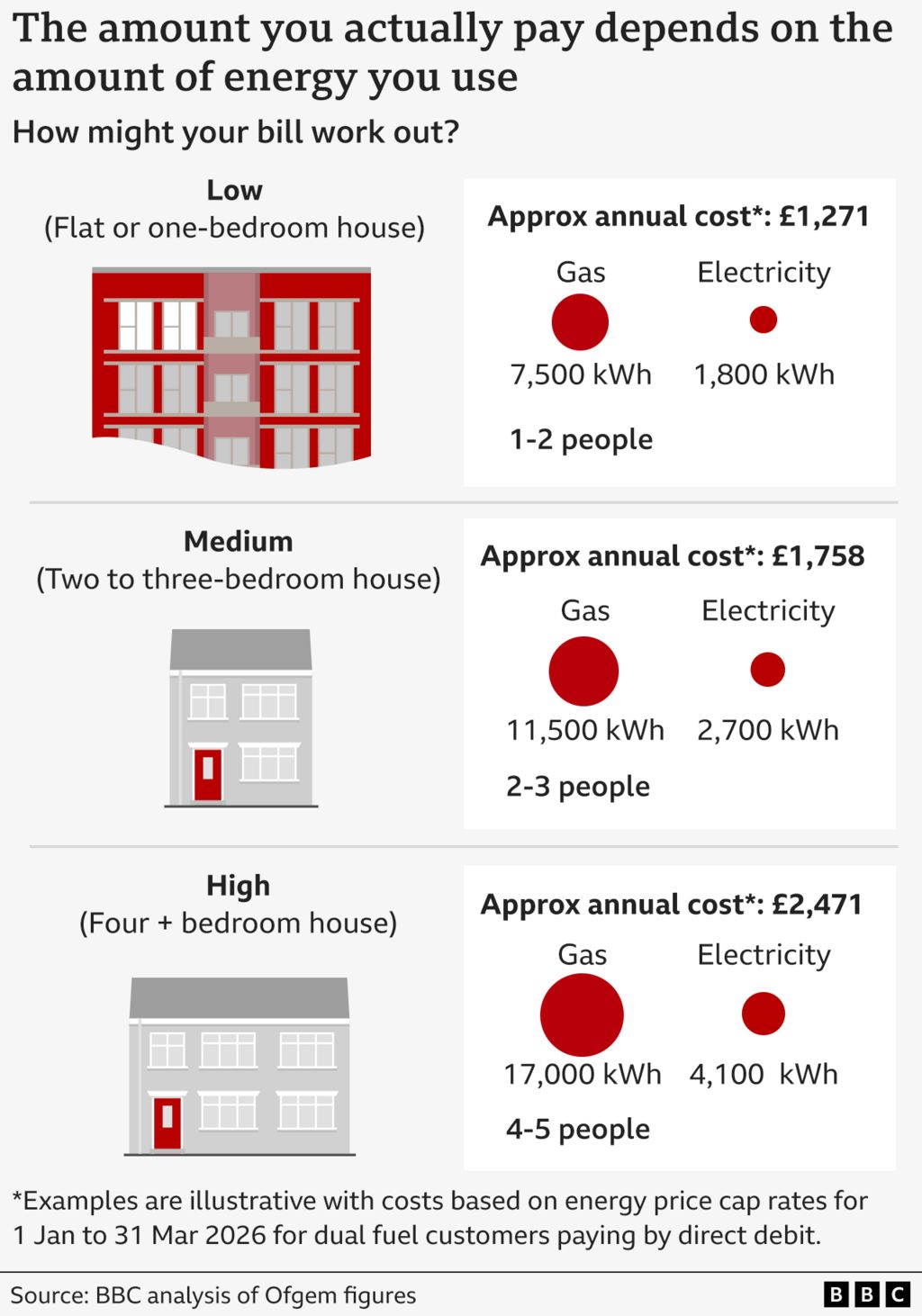Households face unexpected rise in energy prices in new year

Millions of households will see a slight rise in energy prices in the depths of winter, after regulator Ofgem outlined its next price cap.
The 0.2% increase from the current cap will take effect at the start of January, and affect those on variable tariffs in England, Wales and Scotland.
The rise was a surprise after forecasters suggested the cap may fall at the start of the year. Government policy is primarily behind the shift.
Gas and electricity bills remain relatively high, and the sudden drop in temperature has brought the costs to the forefront of people's minds.
"While wholesale energy costs are stabilising, they still make up the largest portion of our bills which leaves us open to volatile prices," said Tim Jarvis, from Ofgem.
Rising electricity unit rates are behind the latest change, offset by a slight fall in gas rates. So, heavy users of electricity will see the biggest impact.
Prices will be slightly lower than the same period the previous year, but Mr Jarvis said the cap was a backstop and people could take action - such as shopping around for a fixed tariff - to reduce their bill.
Ofgem said the price cap change was driven by government policy costs and operating costs, such as funding the Sizewell C nuclear project which adds £1 a month to a typical bill.

The cap sets the maximum price for each unit of gas and electricity, not the total bill - so those who use more energy, pay more.
The Ofgem cap is illustrated with a household using a "typical" amount of 11,500 kWh of gas and 2,700 kWh of electricity a year with a single bill for gas and electricity, settled by direct debit. This household would see a £3 rise in its annual bill from £1,755 to £1,758.
However, the amount used varies significantly between households, so the best way to calculate the change is to work out the percentage change from your own usual annual bill.
Standing charges - the fixed costs that cover the cost of running the network as well as government levies - will rise by 2% for electricity and 3% for gas.
Dame Clare Moriarty from Citizens Advice said: "With bills still drastically higher than before the energy crisis, and due to rise again from April, it's high time for decisions about the longer term."

At St Nicholas Church in Maidstone, Kent, there is a community hub for parents and toddlers in one room, and a get together over tea and cake for the older generation in another.
Liz Walker, one of the organisers of the morning cafe, said small changes had helped everyone with the cost of energy.
"We are into winter now and we open the doors earlier, as we have for the last three years, because it means some people won't have to put their heating on for the whole morning."
Debt worries
Charities say they are seeing people owing increasing levels of unpaid bills and charges to suppliers.
The total amount owed has reached a record £4.4bn, prompting plans from Ofgem to ensure energy companies write off some of that debt.
Up to £500m could be knocked off the total under plans the regulator wants to take effect next year.
Dhara Vyas, chief executive of Energy UK, which represents suppliers, said anyone facing difficulties paying should contact their energy provider as soon as possible.
"We know that far too many people are struggling to pay for the energy they need to use," she said.

But she added suppliers could help with efficient appliances, more tailored tariffs or ensuring people were on the correct benefits.
Energy consultancy Cornwall Insight, which had expected the cap to fall, said Ofgem's announcement marked "the beginning of a potential trend" in which the main driver of higher bills would be government policies as opposed to higher wholesale energy prices.
Principal consultant Dr Craig Lowrey said households faced bills rising further in April due to the costs of running the energy network and transitioning to net zero.
But he added: "A low carbon system means more energy security and less exposure to the rollercoaster of fossil fuel prices."
The government has hinted at extra cost-of-living support in next week's Budget.
One option said to be under consideration is removing VAT from energy bills, which would cut about £80 from annual bills.
Dr Lowrey said any support would be "zero-sum" as "these costs will still need to be recovered, whether through bills or through taxes, as the pipes, wires, and networks that keep the lights on still need investment as we move to a cleaner, more secure energy system".
Energy Minister Martin McCluskey said energy bills "remain too high", but that the government was taking action, with "millions more families receiving £150 off their bills through the expanded Warm Home Discount scheme".
But the Conservatives said Labour's net zero policies were "making energy unaffordable".
Shadow energy secretary Claire Coutinho said: "Ed Miliband promised to cut everyone's energy bills by £300 but more and more experts are sounding the alarm that his plans will lock us into paying higher bills for decades."
In the meantime, as the cold weather sets in, various tips are available to keep people warm while controlling costs, including clothing, insulation and heating rooms people are in rather than the whole home.

Get our flagship newsletter with all the headlines you need to start the day. Sign up here.
(Feed generated with FetchRSS)
